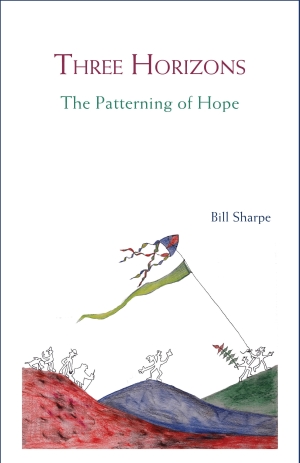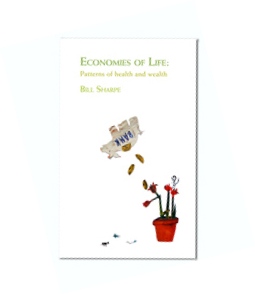Publications
Three Horizons: the Patterning of Hope  Three Horizons is a simple and intuitive framework for thinking about the future. But it is about much more than simply streching our thinking to embrace the short, medium and long term. Here Bill Sharpe introduces Three Horizons as a prompt for developing 'future consciousness' - a rich and multi-faceted awareness of the future potential of the present moment - and explores how to put that awareness to work to create the futures we aspire to. Three Horizons is a simple and intuitive framework for thinking about the future. But it is about much more than simply streching our thinking to embrace the short, medium and long term. Here Bill Sharpe introduces Three Horizons as a prompt for developing 'future consciousness' - a rich and multi-faceted awareness of the future potential of the present moment - and explores how to put that awareness to work to create the futures we aspire to.
The book first outlines the Three Horizon framework and the practices it supports, including case studies of its effective application in rural community development, education, healthcare and elsewhere. In the final section, Sharpe explores his intuition "that we have within us a far deeper capacity for shared life than we are using, and that we are suffering from an attempt to know our way into the future instead of live our way". Here he thrillingly outlines the potential of future consciousness as a shared cultural practice to guide society towards a third horizon that is the patterning of our mutual hopes. "How can an eclectic group of experts, with very different worldviews, come to a shared vision for the future? Using the Three Horizons framework, skilled facilitators achieved the seemingly impossible and enabled the Carnegie Commission for Rural Community Development to agree a compelling, inspiring and hopeful blueprintfor the future of rural communities. Now Bill Sharpe reveals the full potential for this way of thinking to generate practical hope in all kinds of complex policy areas." Kate Braithwaite, Operations Director, UnLtd; formerly Carnegie UK Trust "We need to pass from worrying about the future to constructively engaging upon its creation. For all those interested in this task, this book delivers a powerful way of thinking about that future in qualitatively different horizons. If we want transformation to be more than just an aspiration, then we need to position it and to understand the dilemmas that define progress towards a better society. This book helps with that positioning and puts discipline into the process of foresight." Professor Peter Kawalek, Manchester Business School "Every so often a new futures method comes along that opens up new ways of seeing the future. Three Horizons is such a method. It links the present to possible futures, and embodies ways of identifying strategic and innovation challenges. Bill Sharpe, one of the Three Horizon pioneers, has written a valuable primer on its theory and emerging practice." Andrew Curry, The Futures Company "Three Horizons provides a valuable tool for understanding the complexity hidden in past trends and the choices always implicit in the apparent determinism of future possibilities. Bill Sharpe's book helps us break out of the Newtonian deterministic thinking that so often blinds us to the choices we have made and reveals our power to alter them." Garry Jacobs, Chairman and CEO, World Academy of Art and Science "It has been a privilege to work with Pierre Wack and Bill Sharpe in thinking about the future and turning it into action. Both understand visionary action planning at its best." Napier Collyns, Co-founder Global Business Network Buy now from Triarchy Press Economies of Life: Patterns of Health and Wealth
Economies of Life argues cogently that there is a 'default assumption that there is only one economy in our lives - the economy which is the one based on money. Our position is that there are many economies, of which the one based on money is just one, and that they all contribute to the health and sustainability of our shared lives'. Extending this idea, money is the currency of the economy of exchange, and art can be viewed as the currency of the economy of experience. In this collection of five essays, Bill Sharpe uses the principles of ecological thinking to redefine our hitherto narrow understanding of terms like economy and value. The essays consider what keeps each economy healthy, what sort of wealth each one accumulates and what sort of policies are most supportive of innovation and sustainability in a changing world. Bill Sharpe and a small group of other IFF members, working with the Watershed Media Centre in Bristol, took as the starting point for their inquiry the qustion 'Can we help people who fund the arts develop better policies if we use ecological thinking to understand how the arts work in society and in the economy?' The resulting parallel publication from the Watershed - Producing the Future: Understanding Watershed's role in Ecosystems of Cultural Innovation - outlines the thinking undertaken by IFF and the Watershed in order to undertand what makes for a healthy, creative, innovative ecosystem. Itoffers as a case study the experience of putting these emerging ideas into practice at Watershed. 'Economies of Life] is a very significant, and hard won, contribution to our collective thinking. I believe the ideas these essays contain open up new perspectives on critical issues way beyond the arts. The notion of multiple currencies being in play, for example, is easy to grasp intuitively and is already proving a useful antidote to conversations that in the context of a recession have become fixated only on money.'
Graham Leicester, Director of IFF 'At last, a fresh perspective on value that reclaims the pivotal role of the arts in the economy of meaning. Thought-provoking reading for policy-makers, grant givers and for artists themselves.'
Russell Willis Taylor, President and CEO, National Arts Strategies, Washington DC 'Invaluable insights to help us build a shared approach to arts practice, measurement and funding. An essential guide to understanding the dilemma between making money and making meaning.'
Dick Penny, Managing Director, Watershed and Chair, Bristol Old Vic Buy now from Triarchy Press Scenarios for Success: Turning Insights into Action  How can we look over the horizon of the known and commit ourselves to new courses of action? How do we bring together knowledge and creativity to make decisions that have far reaching impact for success, and even survival? How can we put the forces shaping our world into play with emerging possibilities and come up with a unique entrepreneurial insight? Scenario thinking has stood the test of time as a way to tackle these questions in every domain from long-range global public policy to the business plan of a start-up. How can we look over the horizon of the known and commit ourselves to new courses of action? How do we bring together knowledge and creativity to make decisions that have far reaching impact for success, and even survival? How can we put the forces shaping our world into play with emerging possibilities and come up with a unique entrepreneurial insight? Scenario thinking has stood the test of time as a way to tackle these questions in every domain from long-range global public policy to the business plan of a start-up.
In 2005 the Oxford Futures Forum brought together 70 leading futures practitioners to share their experience of how to use scenarios for organisational success: how to develop deep insight into the drivers of change, and how to turn that insight into effective action. The Forum revealed a vibrant practice that is developing many new approaches to extend scenario approaches to cope with the increasing demands for rapid response to a complex world. Where many management methods attempt to reduce decisions to some standardised process to deliver fixed results in fixed times, scenario thinking is still rooted in making space for the essential ‘magic’ of original insight to happen.
These papers, never published before, bring the newest thinking in the field of scenarios to a wider audience. Critical reflection on many case studies drawn from first hand experience has produced an invaluable resource for organisations aiming to achieve leadership in their strategic thinking and action.
Buy now from Amazon.
UK ForesightThe following reports are all available from the UK Foresight web site. Cognitive Systems: Applications and Impact Cybertrust & Crime Prevention Technology Forward Look Intelligent Infrastructure Systems: Towards a Cyber-Urban Ecology Tackling Obesities: Technology Forward look
|